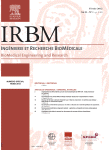
Biomedical Engineering Letters
Scope & Guideline
Exploring the intersection of engineering and medicine.
Introduction
Aims and Scopes
- Medical Imaging Technologies:
The journal extensively covers advancements in medical imaging techniques, including image reconstruction, segmentation, and analysis methods, particularly those utilizing deep learning and artificial intelligence. - Wearable and Implantable Devices:
Research on the design and application of wearable and implantable medical devices is a key focus, with studies exploring their integration, functionality, and patient monitoring capabilities. - Biomedical Signal Processing:
The journal publishes work on processing physiological signals, such as ECG, EEG, and PPG, utilizing modern computational methods to improve diagnostic accuracy and patient care. - Nanotechnology in Medicine:
Innovative applications of nanotechnology in drug delivery, biosensors, and tissue engineering are prominent, highlighting the potential of nanoscale materials in enhancing therapeutic outcomes. - Robotic Systems in Surgery:
The journal features research on robotic-assisted surgical techniques, emphasizing the development and optimization of robotic systems for minimally invasive procedures. - Machine Learning and AI Applications:
There is a strong emphasis on the application of machine learning and artificial intelligence in various biomedical fields, from predictive modeling to automated diagnostics.
Trending and Emerging
- Deep Learning in Medical Imaging:
The application of deep learning techniques for medical image reconstruction, segmentation, and analysis is rapidly increasing, showcasing the potential of AI to enhance diagnostic accuracy. - Robotics and Automation in Surgery:
There is a growing trend in the development of robotic systems for surgical applications, with a focus on improving precision and outcomes in minimally invasive procedures. - Telehealth and Remote Monitoring:
The rise of telehealth solutions and remote monitoring technologies is a significant emerging theme, driven by the need for accessible healthcare solutions, particularly in light of recent global health challenges. - Nanomedicine and Targeted Therapies:
Research into nanomedicine and targeted drug delivery systems is gaining momentum, highlighting innovative approaches to enhance treatment efficacy and reduce side effects. - Wearable Health Technologies:
The development of advanced wearable technologies for continuous health monitoring and data collection is trending, reflecting a shift towards proactive health management. - Bioinformatics and Computational Biology:
There is an increasing focus on bioinformatics and computational methods to analyze complex biological data, facilitating breakthroughs in personalized medicine and genomics.
Declining or Waning
- Traditional Biomedical Devices:
Research on conventional biomedical devices, such as basic prosthetics and traditional diagnostic tools, is becoming less prevalent as the field shifts towards more advanced, integrated solutions. - Basic Surgical Techniques:
Studies focusing solely on traditional surgical techniques without the integration of robotics or advanced imaging technologies are seeing reduced publication frequency. - Conventional Drug Delivery Systems:
There is a noticeable decline in the exploration of conventional drug delivery systems, with a shift towards innovative, nanotechnology-based approaches. - Static Data Analysis:
The focus on static data analysis methods, without the integration of real-time or adaptive learning techniques, appears to be waning as dynamic methodologies gain traction. - Basic Rehabilitation Techniques:
Research on traditional rehabilitation methods is less common, overshadowed by studies incorporating advanced technologies like robotics and AI-driven rehabilitation frameworks.
Similar Journals

Journal of Mechanics in Medicine and Biology
Pioneering Interdisciplinary Solutions in Medicine and BiologyThe Journal of Mechanics in Medicine and Biology, published by World Scientific Publishing Co Pte Ltd, serves as a critical platform for interdisciplinary research at the intersection of engineering and biomedical sciences. With an ISSN of 0219-5194 and E-ISSN of 1793-6810, this esteemed journal has been dedicated to exploring the mechanical principles that govern biological systems since its inception in 2008. Based in Singapore, it addresses a diverse range of topics, from biomaterials to biomechanics, contributing valuable insights into the field’s evolving landscape. Although currently positioned in Q4 of Biomedical Engineering according to the 2023 category quartiles, it is poised for growth and increased visibility within the scientific community, fostering innovation and collaboration among researchers, professionals, and students alike. The journal emphasizes the importance of cutting-edge research and its practical implications, making it a vital resource for those striving to enhance the future of medical technologies and biological understanding.

Nature Biomedical Engineering
Connecting Engineers and Scientists for Global ImpactNature Biomedical Engineering is a premier journal published by NATURE PORTFOLIO, focusing on innovative research at the intersection of engineering and biomedical sciences. With an ISSN of 2157-846X, this journal aims to disseminate groundbreaking studies that advance the field of bioengineering, biotechnology, and medical applications. Since its inception in 2017, it has rapidly earned a reputation for excellence, consistently achieving a Q1 ranking in various categories including Bioengineering and Biomedical Engineering, and receiving acclaim in prestigious Scopus rankings, boasting top positions in the fields of Computer Science Applications and Medicine. The journal operates under a rigorous peer-review process, ensuring that all published articles contribute substantially to the existing body of knowledge. Furthermore, it facilitates a broad accessibility model for researchers and practitioners, bolstering collaboration and innovation within the global scientific community. Nature Biomedical Engineering is not just a publication; it serves as a vital platform for thought leadership in the transformative field of biomedical engineering.

MEDICAL ENGINEERING & PHYSICS
Pioneering Innovations in Biomedical Engineering and BiophysicsMEDICAL ENGINEERING & PHYSICS, published by Elsevier Science Ltd, is an esteemed journal in the fields of Biomedical Engineering and Biophysics. With an ISSN of 1350-4533 and an E-ISSN of 1873-4030, it has established itself as a significant resource from its inception in 1994, continuing to deliver pivotal research up to 2024. This journal, categorized in the Q3 quartile for both Biomedical Engineering and Biophysics, holds a respectable position in Scopus rankings, boasting its relevance in the upper echelons of academic inquiry, particularly ranking #75/152 in Biophysics and #158/303 in Biomedical Engineering. Authors and researchers in these dynamic fields will find the journal’s rigorous peer-review process and commitment to publishing high-quality original research invaluable for advancing their work. Although the journal is not open access, it continues to attract submissions that push the boundaries of innovation and application in medical technologies, making it an essential resource for anyone dedicated to the integration of engineering principles with medical sciences.

Bio-Design and Manufacturing
Unveiling the Science of Efficient Bio-ManufacturingBio-Design and Manufacturing, published by SPRINGER HEIDELBERG, is a pioneering journal that stands at the forefront of innovation in the fields of Biomedical Engineering, Biotechnology, Industrial and Manufacturing Engineering, and Materials Science. With its ISSN 2096-5524 and E-ISSN 2522-8552, this journal has established itself as a leading platform for disseminating cutting-edge research and advancements that merge biological principles with manufacturing processes, emphasizing sustainable and efficient practices. It has garnered recognition in the 2023 category quartiles, boasting a Q1 rank in all its relevant fields, which underscores its significance and impact—evident from its prime Scopus rankings that place it within the top percentiles of numerous engineering and materials science disciplines. Researchers, professionals, and students alike benefit from the wealth of knowledge presented in this journal, making it an essential resource for those seeking to enhance their understanding of bio-design applications and innovation in manufacturing processes.

CONCEPTS IN MAGNETIC RESONANCE PART B-MAGNETIC RESONANCE ENGINEERING
Transforming Research into Real-World Applications in Medicine.CONCEPTS IN MAGNETIC RESONANCE PART B-MAGNETIC RESONANCE ENGINEERING is a premier journal published by WILEY-HINDAWI, dedicated to advancing the field of magnetic resonance engineering. With an ISSN of 1552-5031 and E-ISSN 1552-504X, this journal offers an Open Access platform since 2022, ensuring that research is freely accessible to scholars worldwide. Covering a broad spectrum of applications in medicine, radiology, nuclear medicine, and imaging, it serves as a key resource for professionals looking to stay updated with the latest advancements and innovations in the field. The journal enjoys notable rankings in various categories, including a rank of #137 in Medicine and #26 in Health Professions within Scopus, reflecting its importance and influence in both academic and clinical settings. As a vital conduit for cutting-edge research, CONCEPTS IN MAGNETIC RESONANCE PART B is committed to fostering the growth of knowledge while addressing the critical challenges and technological enhancements within magnetic resonance methodologies. Researchers, professionals, and students can expect to find comprehensive articles that adhere to high scientific standards, promoting discourse and collaboration across disciplines.

Annual Review of Biomedical Engineering
Advancing the Frontiers of Biomedical InnovationAnnual Review of Biomedical Engineering, published by Annual Reviews, stands as a leading academic journal dedicated to the rapidly evolving field of biomedical engineering. With an impressive impact factor that reflects its high citation rates and rigorous peer-review process, this journal offers critical insights by synthesizing cutting-edge advancements and applications in both biomedical engineering and miscellaneous medicine. The journal, which is available in both print (ISSN: 1523-9829) and electronic formats (E-ISSN: 1545-4274), serves as an essential resource for researchers, professionals, and students aiming to stay abreast of significant developments and emerging trends. As of 2023, it is recognized in the top tier (Q1) for both Biomedical Engineering and Medicine, showcasing its esteemed position within the academic community, reflected in its high Scopus rankings. Spanning from 1999 to 2024, the Annual Review of Biomedical Engineering continues to catalyze interdisciplinary collaboration and innovation at the intersection of engineering and healthcare.

IEEE Open Journal of Engineering in Medicine and Biology
Unlocking the potential of interdisciplinary research.IEEE Open Journal of Engineering in Medicine and Biology is a premier Open Access journal published by the esteemed IEEE-INST ELECTRICAL ELECTRONICS ENGINEERS INC, dedicated to advancing the interdisciplinary fields of biomedical engineering and medicine. Since its inception in 2020, the journal has quickly established itself within the academic community, boasting a notable ranking of #49 out of 303 in the Biomedical Engineering category on Scopus and achieving an impressive 83rd percentile. With an objective of disseminating high-quality research and innovative developments that bridge engineering and medical sciences, the journal is committed to fostering collaboration among researchers, healthcare professionals, and policymakers. Operating with Open Access since 2020 allows for wider accessibility and dissemination of cutting-edge findings, promoting the exchange of knowledge vital for tackling contemporary challenges in health technology. As the journal continues to grow through to 2024, it remains a vital resource for anyone invested in the enhancement of medical technology and the betterment of patient care.

BIOMEDICAL ENGINEERING-APPLICATIONS BASIS COMMUNICATIONS
Empowering researchers to transform biomedical landscapes.BIOMEDICAL ENGINEERING-APPLICATIONS BASIS COMMUNICATIONS is a prominent journal dedicated to the dynamic field of biomedical engineering, published by WORLD SCIENTIFIC PUBL CO PTE LTD. Since its inception in 1992, the journal has provided a platform for the dissemination of high-quality research and innovative applications within the biomedical engineering domain. Despite its current Q4 ranking in multiple categories such as Bioengineering and Biomedical Engineering, the journal serves as an essential resource for researchers and professionals seeking to explore the latest developments and practical applications in this interdisciplinary field. The journal is based in Singapore, reflecting the region's growing influence in scientific research and technology. Although it does not offer open access, it continues to attract submissions that enrich the scientific dialogue within its community. With a commitment to fostering knowledge and research collaboration, this journal remains a vital contributor to the ongoing advancements in biomedical technology and engineering.

IRBM
Elevating the Dialogue in Biomedical Engineering and BiophysicsIRBM, published by Elsevier Science Inc, stands at the forefront of research in the domains of Biomedical Engineering and Biophysics, boasting impressively high rankings with a Q1 category in both fields according to the 2023 evaluations. With an effective focus on cutting-edge innovations and methodologies, IRBM provides a vital platform for researchers, professionals, and students alike seeking to disseminate and access groundbreaking findings and developments. Its strong presence in the Scopus database, with ranks of #12 in Biochemistry, Genetics and Molecular Biology and #42 in Biomedical Engineering, places it in the top percentile of impactful journals in the field, making it a crucial resource for advancing knowledge and fostering collaboration. While the journal maintains a traditional subscription model, it continues to attract a diverse readership eager for insightful studies and reviews that push the boundaries of science and engineering. With a projected convergence of years extending to 2024, IRBM promises to remain a significant contributor to the ongoing dialogue in the life sciences.

Biomedical Physics & Engineering Express
Innovating at the Intersection of Science and MedicineBiomedical Physics & Engineering Express, published by IOP Publishing Ltd, serves as a dynamic platform for the dissemination of groundbreaking research in the interdisciplinary domains of biomedical physics, engineering, and related fields. With a focus on innovative solutions for healthcare challenges, the journal extends its reach to a global audience, providing valuable insights that influence both academic research and practical applications. Operating under an open-access format, this journal ensures that vital scientific discoveries are readily available to researchers, professionals, and students alike. Ranking within the Q3 and Q4 quartiles across various categories—including Bioengineering and Biomedical Engineering—indicates its emerging influence in the scientific community since its inception in 2015. With an increasing footprint in Scopus rankings and a commitment to advancing knowledge in subfields such as biophysics and health informatics, Biomedical Physics & Engineering Express plays a crucial role in shaping future innovations in healthcare technology and patient care.